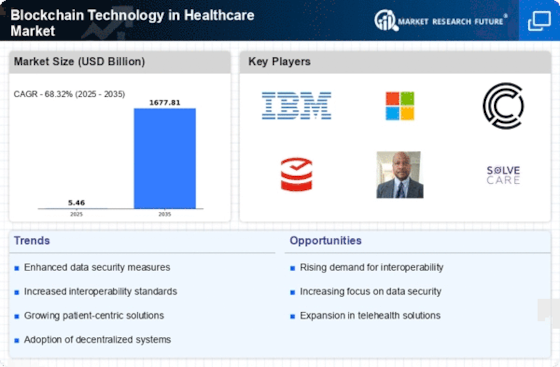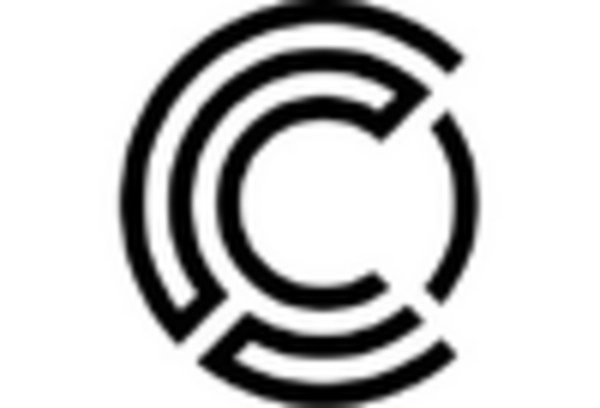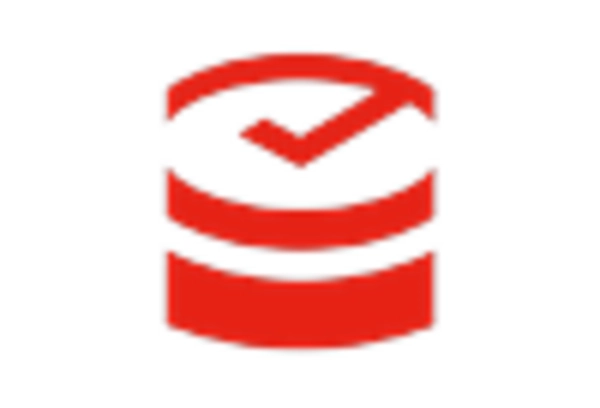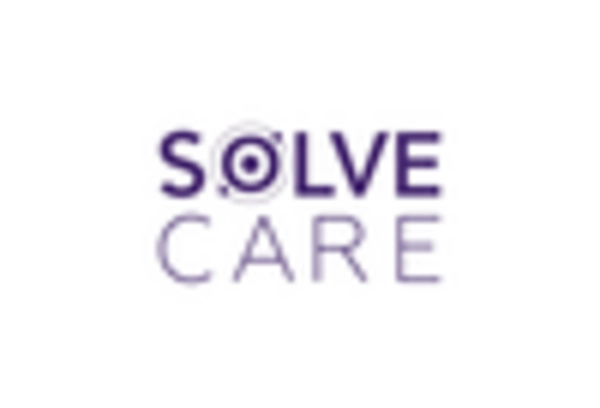-
EXECUTIVE SUMMARY
-
Market Overview
-
Key Findings
-
Market Segmentation
-
Competitive Landscape
-
Challenges and Opportunities
-
Future Outlook
-
MARKET INTRODUCTION
-
Definition
-
Scope of the study
- Research Objective
- Assumption
- Limitations
-
RESEARCH METHODOLOGY
-
Overview
-
Data Mining
-
Secondary Research
-
Primary Research
- Primary Interviews and Information Gathering Process
- Breakdown of Primary Respondents
-
Forecasting Model
-
Market Size Estimation
- Bottom-Up Approach
- Top-Down Approach
-
Data Triangulation
-
Validation
-
MARKET DYNAMICS
-
Overview
-
Drivers
-
Restraints
-
Opportunities
-
MARKET FACTOR ANALYSIS
-
Value chain Analysis
-
Porter's Five Forces Analysis
- Bargaining Power of Suppliers
- Bargaining Power of Buyers
- Threat of New Entrants
- Threat of Substitutes
- Intensity of Rivalry
-
COVID-19 Impact Analysis
- Market Impact Analysis
- Regional Impact
- Opportunity and Threat Analysis
-
BLOCKCHAIN TECHNOLOGY IN HEALTHCARE MARKET, BY APPLICATION (USD BILLION)
-
Clinical Trials
-
Supply Chain Management
-
Patient Medical Records
-
Claims Management
-
Drug Traceability
-
BLOCKCHAIN TECHNOLOGY IN HEALTHCARE MARKET, BY END USE (USD BILLION)
-
Healthcare Providers
-
Pharmaceutical Companies
-
Insurance Companies
-
Research Institutions
-
BLOCKCHAIN TECHNOLOGY IN HEALTHCARE MARKET, BY NETWORK TYPE (USD BILLION)
-
Public Blockchain
-
Private Blockchain
-
Hybrid Blockchain
-
BLOCKCHAIN TECHNOLOGY IN HEALTHCARE MARKET, BY COMPONENT (USD BILLION)
-
Software
-
Hardware
-
Services
-
BLOCKCHAIN TECHNOLOGY IN HEALTHCARE MARKET, BY REGIONAL (USD BILLION)
-
North America
- US
- Canada
-
Europe
- Germany
- UK
- France
- Russia
- Italy
- Spain
- Rest of Europe
-
APAC
- China
- India
- Japan
- South Korea
- Malaysia
- Thailand
- Indonesia
- Rest of APAC
-
South America
- Brazil
- Mexico
- Argentina
- Rest of South America
-
MEA
- GCC Countries
- South Africa
- Rest of MEA
-
COMPETITIVE LANDSCAPE
-
Overview
-
Competitive Analysis
-
Market share Analysis
-
Major Growth Strategy in the Blockchain Technology in Healthcare Market
-
Competitive Benchmarking
-
Leading Players in Terms of Number of Developments in the Blockchain Technology in Healthcare Market
-
Key developments and growth strategies
- New Product Launch/Service Deployment
- Merger & Acquisitions
- Joint Ventures
-
Major Players Financial Matrix
- Sales and Operating Income
- Major Players R&D Expenditure. 2023
-
COMPANY PROFILES
-
IBM
- Financial Overview
- Products Offered
- Key Developments
- SWOT Analysis
- Key Strategies
-
Modum
- Financial Overview
- Products Offered
- Key Developments
- SWOT Analysis
- Key Strategies
-
Everledger
- Financial Overview
- Products Offered
- Key Developments
- SWOT Analysis
- Key Strategies
-
Patientory
- Financial Overview
- Products Offered
- Key Developments
- SWOT Analysis
- Key Strategies
-
Medicalchain
- Financial Overview
- Products Offered
- Key Developments
- SWOT Analysis
- Key Strategies
-
Guardtime
- Financial Overview
- Products Offered
- Key Developments
- SWOT Analysis
- Key Strategies
-
Solve.Care
- Financial Overview
- Products Offered
- Key Developments
- SWOT Analysis
- Key Strategies
-
Pioneers
- Financial Overview
- Products Offered
- Key Developments
- SWOT Analysis
- Key Strategies
-
Chronicled
- Financial Overview
- Products Offered
- Key Developments
- SWOT Analysis
- Key Strategies
-
Microsoft
- Financial Overview
- Products Offered
- Key Developments
- SWOT Analysis
- Key Strategies
-
Factom
- Financial Overview
- Products Offered
- Key Developments
- SWOT Analysis
- Key Strategies
-
BurstIQ
- Financial Overview
- Products Offered
- Key Developments
- SWOT Analysis
- Key Strategies
-
SimplyVital Health
- Financial Overview
- Products Offered
- Key Developments
- SWOT Analysis
- Key Strategies
-
Gem
- Financial Overview
- Products Offered
- Key Developments
- SWOT Analysis
- Key Strategies
-
APPENDIX
-
References
-
Related Reports
-
LIST OF TABLES
-
LIST OF ASSUMPTIONS
-
NORTH AMERICA BLOCKCHAIN TECHNOLOGY IN HEALTHCARE MARKET SIZE ESTIMATES & FORECAST, BY APPLICATION, 2019-2035 (USD BILLIONS)
-
NORTH AMERICA BLOCKCHAIN TECHNOLOGY IN HEALTHCARE MARKET SIZE ESTIMATES & FORECAST, BY END USE, 2019-2035 (USD BILLIONS)
-
NORTH AMERICA BLOCKCHAIN TECHNOLOGY IN HEALTHCARE MARKET SIZE ESTIMATES & FORECAST, BY NETWORK TYPE, 2019-2035 (USD BILLIONS)
-
NORTH AMERICA BLOCKCHAIN TECHNOLOGY IN HEALTHCARE MARKET SIZE ESTIMATES & FORECAST, BY COMPONENT, 2019-2035 (USD BILLIONS)
-
NORTH AMERICA BLOCKCHAIN TECHNOLOGY IN HEALTHCARE MARKET SIZE ESTIMATES & FORECAST, BY REGIONAL, 2019-2035 (USD BILLIONS)
-
US BLOCKCHAIN TECHNOLOGY IN HEALTHCARE MARKET SIZE ESTIMATES & FORECAST, BY APPLICATION, 2019-2035 (USD BILLIONS)
-
US BLOCKCHAIN TECHNOLOGY IN HEALTHCARE MARKET SIZE ESTIMATES & FORECAST, BY END USE, 2019-2035 (USD BILLIONS)
-
US BLOCKCHAIN TECHNOLOGY IN HEALTHCARE MARKET SIZE ESTIMATES & FORECAST, BY NETWORK TYPE, 2019-2035 (USD BILLIONS)
-
US BLOCKCHAIN TECHNOLOGY IN HEALTHCARE MARKET SIZE ESTIMATES & FORECAST, BY COMPONENT, 2019-2035 (USD BILLIONS)
-
US BLOCKCHAIN TECHNOLOGY IN HEALTHCARE MARKET SIZE ESTIMATES & FORECAST, BY REGIONAL, 2019-2035 (USD BILLIONS)
-
CANADA BLOCKCHAIN TECHNOLOGY IN HEALTHCARE MARKET SIZE ESTIMATES & FORECAST, BY APPLICATION, 2019-2035 (USD BILLIONS)
-
CANADA BLOCKCHAIN TECHNOLOGY IN HEALTHCARE MARKET SIZE ESTIMATES & FORECAST, BY END USE, 2019-2035 (USD BILLIONS)
-
CANADA BLOCKCHAIN TECHNOLOGY IN HEALTHCARE MARKET SIZE ESTIMATES & FORECAST, BY NETWORK TYPE, 2019-2035 (USD BILLIONS)
-
CANADA BLOCKCHAIN TECHNOLOGY IN HEALTHCARE MARKET SIZE ESTIMATES & FORECAST, BY COMPONENT, 2019-2035 (USD BILLIONS)
-
CANADA BLOCKCHAIN TECHNOLOGY IN HEALTHCARE MARKET SIZE ESTIMATES & FORECAST, BY REGIONAL, 2019-2035 (USD BILLIONS)
-
EUROPE BLOCKCHAIN TECHNOLOGY IN HEALTHCARE MARKET SIZE ESTIMATES & FORECAST, BY APPLICATION, 2019-2035 (USD BILLIONS)
-
EUROPE BLOCKCHAIN TECHNOLOGY IN HEALTHCARE MARKET SIZE ESTIMATES & FORECAST, BY END USE, 2019-2035 (USD BILLIONS)
-
EUROPE BLOCKCHAIN TECHNOLOGY IN HEALTHCARE MARKET SIZE ESTIMATES & FORECAST, BY NETWORK TYPE, 2019-2035 (USD BILLIONS)
-
EUROPE BLOCKCHAIN TECHNOLOGY IN HEALTHCARE MARKET SIZE ESTIMATES & FORECAST, BY COMPONENT, 2019-2035 (USD BILLIONS)
-
EUROPE BLOCKCHAIN TECHNOLOGY IN HEALTHCARE MARKET SIZE ESTIMATES & FORECAST, BY REGIONAL, 2019-2035 (USD BILLIONS)
-
GERMANY BLOCKCHAIN TECHNOLOGY IN HEALTHCARE MARKET SIZE ESTIMATES & FORECAST, BY APPLICATION, 2019-2035 (USD BILLIONS)
-
GERMANY BLOCKCHAIN TECHNOLOGY IN HEALTHCARE MARKET SIZE ESTIMATES & FORECAST, BY END USE, 2019-2035 (USD BILLIONS)
-
GERMANY BLOCKCHAIN TECHNOLOGY IN HEALTHCARE MARKET SIZE ESTIMATES & FORECAST, BY NETWORK TYPE, 2019-2035 (USD BILLIONS)
-
GERMANY BLOCKCHAIN TECHNOLOGY IN HEALTHCARE MARKET SIZE ESTIMATES & FORECAST, BY COMPONENT, 2019-2035 (USD BILLIONS)
-
GERMANY BLOCKCHAIN TECHNOLOGY IN HEALTHCARE MARKET SIZE ESTIMATES & FORECAST, BY REGIONAL, 2019-2035 (USD BILLIONS)
-
UK BLOCKCHAIN TECHNOLOGY IN HEALTHCARE MARKET SIZE ESTIMATES & FORECAST, BY APPLICATION, 2019-2035 (USD BILLIONS)
-
UK BLOCKCHAIN TECHNOLOGY IN HEALTHCARE MARKET SIZE ESTIMATES & FORECAST, BY END USE, 2019-2035 (USD BILLIONS)
-
UK BLOCKCHAIN TECHNOLOGY IN HEALTHCARE MARKET SIZE ESTIMATES & FORECAST, BY NETWORK TYPE, 2019-2035 (USD BILLIONS)
-
UK BLOCKCHAIN TECHNOLOGY IN HEALTHCARE MARKET SIZE ESTIMATES & FORECAST, BY COMPONENT, 2019-2035 (USD BILLIONS)
-
UK BLOCKCHAIN TECHNOLOGY IN HEALTHCARE MARKET SIZE ESTIMATES & FORECAST, BY REGIONAL, 2019-2035 (USD BILLIONS)
-
FRANCE BLOCKCHAIN TECHNOLOGY IN HEALTHCARE MARKET SIZE ESTIMATES & FORECAST, BY APPLICATION, 2019-2035 (USD BILLIONS)
-
FRANCE BLOCKCHAIN TECHNOLOGY IN HEALTHCARE MARKET SIZE ESTIMATES & FORECAST, BY END USE, 2019-2035 (USD BILLIONS)
-
FRANCE BLOCKCHAIN TECHNOLOGY IN HEALTHCARE MARKET SIZE ESTIMATES & FORECAST, BY NETWORK TYPE, 2019-2035 (USD BILLIONS)
-
FRANCE BLOCKCHAIN TECHNOLOGY IN HEALTHCARE MARKET SIZE ESTIMATES & FORECAST, BY COMPONENT, 2019-2035 (USD BILLIONS)
-
FRANCE BLOCKCHAIN TECHNOLOGY IN HEALTHCARE MARKET SIZE ESTIMATES & FORECAST, BY REGIONAL, 2019-2035 (USD BILLIONS)
-
RUSSIA BLOCKCHAIN TECHNOLOGY IN HEALTHCARE MARKET SIZE ESTIMATES & FORECAST, BY APPLICATION, 2019-2035 (USD BILLIONS)
-
RUSSIA BLOCKCHAIN TECHNOLOGY IN HEALTHCARE MARKET SIZE ESTIMATES & FORECAST, BY END USE, 2019-2035 (USD BILLIONS)
-
RUSSIA BLOCKCHAIN TECHNOLOGY IN HEALTHCARE MARKET SIZE ESTIMATES & FORECAST, BY NETWORK TYPE, 2019-2035 (USD BILLIONS)
-
RUSSIA BLOCKCHAIN TECHNOLOGY IN HEALTHCARE MARKET SIZE ESTIMATES & FORECAST, BY COMPONENT, 2019-2035 (USD BILLIONS)
-
RUSSIA BLOCKCHAIN TECHNOLOGY IN HEALTHCARE MARKET SIZE ESTIMATES & FORECAST, BY REGIONAL, 2019-2035 (USD BILLIONS)
-
ITALY BLOCKCHAIN TECHNOLOGY IN HEALTHCARE MARKET SIZE ESTIMATES & FORECAST, BY APPLICATION, 2019-2035 (USD BILLIONS)
-
ITALY BLOCKCHAIN TECHNOLOGY IN HEALTHCARE MARKET SIZE ESTIMATES & FORECAST, BY END USE, 2019-2035 (USD BILLIONS)
-
ITALY BLOCKCHAIN TECHNOLOGY IN HEALTHCARE MARKET SIZE ESTIMATES & FORECAST, BY NETWORK TYPE, 2019-2035 (USD BILLIONS)
-
ITALY BLOCKCHAIN TECHNOLOGY IN HEALTHCARE MARKET SIZE ESTIMATES & FORECAST, BY COMPONENT, 2019-2035 (USD BILLIONS)
-
ITALY BLOCKCHAIN TECHNOLOGY IN HEALTHCARE MARKET SIZE ESTIMATES & FORECAST, BY REGIONAL, 2019-2035 (USD BILLIONS)
-
SPAIN BLOCKCHAIN TECHNOLOGY IN HEALTHCARE MARKET SIZE ESTIMATES & FORECAST, BY APPLICATION, 2019-2035 (USD BILLIONS)
-
SPAIN BLOCKCHAIN TECHNOLOGY IN HEALTHCARE MARKET SIZE ESTIMATES & FORECAST, BY END USE, 2019-2035 (USD BILLIONS)
-
SPAIN BLOCKCHAIN TECHNOLOGY IN HEALTHCARE MARKET SIZE ESTIMATES & FORECAST, BY NETWORK TYPE, 2019-2035 (USD BILLIONS)
-
SPAIN BLOCKCHAIN TECHNOLOGY IN HEALTHCARE MARKET SIZE ESTIMATES & FORECAST, BY COMPONENT, 2019-2035 (USD BILLIONS)
-
SPAIN BLOCKCHAIN TECHNOLOGY IN HEALTHCARE MARKET SIZE ESTIMATES & FORECAST, BY REGIONAL, 2019-2035 (USD BILLIONS)
-
REST OF EUROPE BLOCKCHAIN TECHNOLOGY IN HEALTHCARE MARKET SIZE ESTIMATES & FORECAST, BY APPLICATION, 2019-2035 (USD BILLIONS)
-
REST OF EUROPE BLOCKCHAIN TECHNOLOGY IN HEALTHCARE MARKET SIZE ESTIMATES & FORECAST, BY END USE, 2019-2035 (USD BILLIONS)
-
REST OF EUROPE BLOCKCHAIN TECHNOLOGY IN HEALTHCARE MARKET SIZE ESTIMATES & FORECAST, BY NETWORK TYPE, 2019-2035 (USD BILLIONS)
-
REST OF EUROPE BLOCKCHAIN TECHNOLOGY IN HEALTHCARE MARKET SIZE ESTIMATES & FORECAST, BY COMPONENT, 2019-2035 (USD BILLIONS)
-
REST OF EUROPE BLOCKCHAIN TECHNOLOGY IN HEALTHCARE MARKET SIZE ESTIMATES & FORECAST, BY REGIONAL, 2019-2035 (USD BILLIONS)
-
APAC BLOCKCHAIN TECHNOLOGY IN HEALTHCARE MARKET SIZE ESTIMATES & FORECAST, BY APPLICATION, 2019-2035 (USD BILLIONS)
-
APAC BLOCKCHAIN TECHNOLOGY IN HEALTHCARE MARKET SIZE ESTIMATES & FORECAST, BY END USE, 2019-2035 (USD BILLIONS)
-
APAC BLOCKCHAIN TECHNOLOGY IN HEALTHCARE MARKET SIZE ESTIMATES & FORECAST, BY NETWORK TYPE, 2019-2035 (USD BILLIONS)
-
APAC BLOCKCHAIN TECHNOLOGY IN HEALTHCARE MARKET SIZE ESTIMATES & FORECAST, BY COMPONENT, 2019-2035 (USD BILLIONS)
-
APAC BLOCKCHAIN TECHNOLOGY IN HEALTHCARE MARKET SIZE ESTIMATES & FORECAST, BY REGIONAL, 2019-2035 (USD BILLIONS)
-
CHINA BLOCKCHAIN TECHNOLOGY IN HEALTHCARE MARKET SIZE ESTIMATES & FORECAST, BY APPLICATION, 2019-2035 (USD BILLIONS)
-
CHINA BLOCKCHAIN TECHNOLOGY IN HEALTHCARE MARKET SIZE ESTIMATES & FORECAST, BY END USE, 2019-2035 (USD BILLIONS)
-
CHINA BLOCKCHAIN TECHNOLOGY IN HEALTHCARE MARKET SIZE ESTIMATES & FORECAST, BY NETWORK TYPE, 2019-2035 (USD BILLIONS)
-
CHINA BLOCKCHAIN TECHNOLOGY IN HEALTHCARE MARKET SIZE ESTIMATES & FORECAST, BY COMPONENT, 2019-2035 (USD BILLIONS)
-
CHINA BLOCKCHAIN TECHNOLOGY IN HEALTHCARE MARKET SIZE ESTIMATES & FORECAST, BY REGIONAL, 2019-2035 (USD BILLIONS)
-
INDIA BLOCKCHAIN TECHNOLOGY IN HEALTHCARE MARKET SIZE ESTIMATES & FORECAST, BY APPLICATION, 2019-2035 (USD BILLIONS)
-
INDIA BLOCKCHAIN TECHNOLOGY IN HEALTHCARE MARKET SIZE ESTIMATES & FORECAST, BY END USE, 2019-2035 (USD BILLIONS)
-
INDIA BLOCKCHAIN TECHNOLOGY IN HEALTHCARE MARKET SIZE ESTIMATES & FORECAST, BY NETWORK TYPE, 2019-2035 (USD BILLIONS)
-
INDIA BLOCKCHAIN TECHNOLOGY IN HEALTHCARE MARKET SIZE ESTIMATES & FORECAST, BY COMPONENT, 2019-2035 (USD BILLIONS)
-
INDIA BLOCKCHAIN TECHNOLOGY IN HEALTHCARE MARKET SIZE ESTIMATES & FORECAST, BY REGIONAL, 2019-2035 (USD BILLIONS)
-
JAPAN BLOCKCHAIN TECHNOLOGY IN HEALTHCARE MARKET SIZE ESTIMATES & FORECAST, BY APPLICATION, 2019-2035 (USD BILLIONS)
-
JAPAN BLOCKCHAIN TECHNOLOGY IN HEALTHCARE MARKET SIZE ESTIMATES & FORECAST, BY END USE, 2019-2035 (USD BILLIONS)
-
JAPAN BLOCKCHAIN TECHNOLOGY IN HEALTHCARE MARKET SIZE ESTIMATES & FORECAST, BY NETWORK TYPE, 2019-2035 (USD BILLIONS)
-
JAPAN BLOCKCHAIN TECHNOLOGY IN HEALTHCARE MARKET SIZE ESTIMATES & FORECAST, BY COMPONENT, 2019-2035 (USD BILLIONS)
-
JAPAN BLOCKCHAIN TECHNOLOGY IN HEALTHCARE MARKET SIZE ESTIMATES & FORECAST, BY REGIONAL, 2019-2035 (USD BILLIONS)
-
SOUTH KOREA BLOCKCHAIN TECHNOLOGY IN HEALTHCARE MARKET SIZE ESTIMATES & FORECAST, BY APPLICATION, 2019-2035 (USD BILLIONS)
-
SOUTH KOREA BLOCKCHAIN TECHNOLOGY IN HEALTHCARE MARKET SIZE ESTIMATES & FORECAST, BY END USE, 2019-2035 (USD BILLIONS)
-
SOUTH KOREA BLOCKCHAIN TECHNOLOGY IN HEALTHCARE MARKET SIZE ESTIMATES & FORECAST, BY NETWORK TYPE, 2019-2035 (USD BILLIONS)
-
SOUTH KOREA BLOCKCHAIN TECHNOLOGY IN HEALTHCARE MARKET SIZE ESTIMATES & FORECAST, BY COMPONENT, 2019-2035 (USD BILLIONS)
-
SOUTH KOREA BLOCKCHAIN TECHNOLOGY IN HEALTHCARE MARKET SIZE ESTIMATES & FORECAST, BY REGIONAL, 2019-2035 (USD BILLIONS)
-
MALAYSIA BLOCKCHAIN TECHNOLOGY IN HEALTHCARE MARKET SIZE ESTIMATES & FORECAST, BY APPLICATION, 2019-2035 (USD BILLIONS)
-
MALAYSIA BLOCKCHAIN TECHNOLOGY IN HEALTHCARE MARKET SIZE ESTIMATES & FORECAST, BY END USE, 2019-2035 (USD BILLIONS)
-
MALAYSIA BLOCKCHAIN TECHNOLOGY IN HEALTHCARE MARKET SIZE ESTIMATES & FORECAST, BY NETWORK TYPE, 2019-2035 (USD BILLIONS)
-
MALAYSIA BLOCKCHAIN TECHNOLOGY IN HEALTHCARE MARKET SIZE ESTIMATES & FORECAST, BY COMPONENT, 2019-2035 (USD BILLIONS)
-
MALAYSIA BLOCKCHAIN TECHNOLOGY IN HEALTHCARE MARKET SIZE ESTIMATES & FORECAST, BY REGIONAL, 2019-2035 (USD BILLIONS)
-
THAILAND BLOCKCHAIN TECHNOLOGY IN HEALTHCARE MARKET SIZE ESTIMATES & FORECAST, BY APPLICATION, 2019-2035 (USD BILLIONS)
-
THAILAND BLOCKCHAIN TECHNOLOGY IN HEALTHCARE MARKET SIZE ESTIMATES & FORECAST, BY END USE, 2019-2035 (USD BILLIONS)
-
THAILAND BLOCKCHAIN TECHNOLOGY IN HEALTHCARE MARKET SIZE ESTIMATES & FORECAST, BY NETWORK TYPE, 2019-2035 (USD BILLIONS)
-
THAILAND BLOCKCHAIN TECHNOLOGY IN HEALTHCARE MARKET SIZE ESTIMATES & FORECAST, BY COMPONENT, 2019-2035 (USD BILLIONS)
-
THAILAND BLOCKCHAIN TECHNOLOGY IN HEALTHCARE MARKET SIZE ESTIMATES & FORECAST, BY REGIONAL, 2019-2035 (USD BILLIONS)
-
INDONESIA BLOCKCHAIN TECHNOLOGY IN HEALTHCARE MARKET SIZE ESTIMATES & FORECAST, BY APPLICATION, 2019-2035 (USD BILLIONS)
-
INDONESIA BLOCKCHAIN TECHNOLOGY IN HEALTHCARE MARKET SIZE ESTIMATES & FORECAST, BY END USE, 2019-2035 (USD BILLIONS)
-
INDONESIA BLOCKCHAIN TECHNOLOGY IN HEALTHCARE MARKET SIZE ESTIMATES & FORECAST, BY NETWORK TYPE, 2019-2035 (USD BILLIONS)
-
INDONESIA BLOCKCHAIN TECHNOLOGY IN HEALTHCARE MARKET SIZE ESTIMATES & FORECAST, BY COMPONENT, 2019-2035 (USD BILLIONS)
-
INDONESIA BLOCKCHAIN TECHNOLOGY IN HEALTHCARE MARKET SIZE ESTIMATES & FORECAST, BY REGIONAL, 2019-2035 (USD BILLIONS)
-
REST OF APAC BLOCKCHAIN TECHNOLOGY IN HEALTHCARE MARKET SIZE ESTIMATES & FORECAST, BY APPLICATION, 2019-2035 (USD BILLIONS)
-
REST OF APAC BLOCKCHAIN TECHNOLOGY IN HEALTHCARE MARKET SIZE ESTIMATES & FORECAST, BY END USE, 2019-2035 (USD BILLIONS)
-
REST OF APAC BLOCKCHAIN TECHNOLOGY IN HEALTHCARE MARKET SIZE ESTIMATES & FORECAST, BY NETWORK TYPE, 2019-2035 (USD BILLIONS)
-
REST OF APAC BLOCKCHAIN TECHNOLOGY IN HEALTHCARE MARKET SIZE ESTIMATES & FORECAST, BY COMPONENT, 2019-2035 (USD BILLIONS)
-
REST OF APAC BLOCKCHAIN TECHNOLOGY IN HEALTHCARE MARKET SIZE ESTIMATES & FORECAST, BY REGIONAL, 2019-2035 (USD BILLIONS)
-
SOUTH AMERICA BLOCKCHAIN TECHNOLOGY IN HEALTHCARE MARKET SIZE ESTIMATES & FORECAST, BY APPLICATION, 2019-2035 (USD BILLIONS)
-
SOUTH AMERICA BLOCKCHAIN TECHNOLOGY IN HEALTHCARE MARKET SIZE ESTIMATES & FORECAST, BY END USE, 2019-2035 (USD BILLIONS)
-
SOUTH AMERICA BLOCKCHAIN TECHNOLOGY IN HEALTHCARE MARKET SIZE ESTIMATES & FORECAST, BY NETWORK TYPE, 2019-2035 (USD BILLIONS)
-
SOUTH AMERICA BLOCKCHAIN TECHNOLOGY IN HEALTHCARE MARKET SIZE ESTIMATES & FORECAST, BY COMPONENT, 2019-2035 (USD BILLIONS)
-
SOUTH AMERICA BLOCKCHAIN TECHNOLOGY IN HEALTHCARE MARKET SIZE ESTIMATES & FORECAST, BY REGIONAL, 2019-2035 (USD BILLIONS)
-
BRAZIL BLOCKCHAIN TECHNOLOGY IN HEALTHCARE MARKET SIZE ESTIMATES & FORECAST, BY APPLICATION, 2019-2035 (USD BILLIONS)
-
BRAZIL BLOCKCHAIN TECHNOLOGY IN HEALTHCARE MARKET SIZE ESTIMATES & FORECAST, BY END USE, 2019-2035 (USD BILLIONS)
-
BRAZIL BLOCKCHAIN TECHNOLOGY IN HEALTHCARE MARKET SIZE ESTIMATES & FORECAST, BY NETWORK TYPE, 2019-2035 (USD BILLIONS)
-
BRAZIL BLOCKCHAIN TECHNOLOGY IN HEALTHCARE MARKET SIZE ESTIMATES & FORECAST, BY COMPONENT, 2019-2035 (USD BILLIONS)
-
BRAZIL BLOCKCHAIN TECHNOLOGY IN HEALTHCARE MARKET SIZE ESTIMATES & FORECAST, BY REGIONAL, 2019-2035 (USD BILLIONS)
-
MEXICO BLOCKCHAIN TECHNOLOGY IN HEALTHCARE MARKET SIZE ESTIMATES & FORECAST, BY APPLICATION, 2019-2035 (USD BILLIONS)
-
MEXICO BLOCKCHAIN TECHNOLOGY IN HEALTHCARE MARKET SIZE ESTIMATES & FORECAST, BY END USE, 2019-2035 (USD BILLIONS)
-
MEXICO BLOCKCHAIN TECHNOLOGY IN HEALTHCARE MARKET SIZE ESTIMATES & FORECAST, BY NETWORK TYPE, 2019-2035 (USD BILLIONS)
-
MEXICO BLOCKCHAIN TECHNOLOGY IN HEALTHCARE MARKET SIZE ESTIMATES & FORECAST, BY COMPONENT, 2019-2035 (USD BILLIONS)
-
MEXICO BLOCKCHAIN TECHNOLOGY IN HEALTHCARE MARKET SIZE ESTIMATES & FORECAST, BY REGIONAL, 2019-2035 (USD BILLIONS)
-
ARGENTINA BLOCKCHAIN TECHNOLOGY IN HEALTHCARE MARKET SIZE ESTIMATES & FORECAST, BY APPLICATION, 2019-2035 (USD BILLIONS)
-
ARGENTINA BLOCKCHAIN TECHNOLOGY IN HEALTHCARE MARKET SIZE ESTIMATES & FORECAST, BY END USE, 2019-2035 (USD BILLIONS)
-
ARGENTINA BLOCKCHAIN TECHNOLOGY IN HEALTHCARE MARKET SIZE ESTIMATES & FORECAST, BY NETWORK TYPE, 2019-2035 (USD BILLIONS)
-
ARGENTINA BLOCKCHAIN TECHNOLOGY IN HEALTHCARE MARKET SIZE ESTIMATES & FORECAST, BY COMPONENT, 2019-2035 (USD BILLIONS)
-
ARGENTINA BLOCKCHAIN TECHNOLOGY IN HEALTHCARE MARKET SIZE ESTIMATES & FORECAST, BY REGIONAL, 2019-2035 (USD BILLIONS)
-
REST OF SOUTH AMERICA BLOCKCHAIN TECHNOLOGY IN HEALTHCARE MARKET SIZE ESTIMATES & FORECAST, BY APPLICATION, 2019-2035 (USD BILLIONS)
-
REST OF SOUTH AMERICA BLOCKCHAIN TECHNOLOGY IN HEALTHCARE MARKET SIZE ESTIMATES & FORECAST, BY END USE, 2019-2035 (USD BILLIONS)
-
REST OF SOUTH AMERICA BLOCKCHAIN TECHNOLOGY IN HEALTHCARE MARKET SIZE ESTIMATES & FORECAST, BY NETWORK TYPE, 2019-2035 (USD BILLIONS)
-
REST OF SOUTH AMERICA BLOCKCHAIN TECHNOLOGY IN HEALTHCARE MARKET SIZE ESTIMATES & FORECAST, BY COMPONENT, 2019-2035 (USD BILLIONS)
-
REST OF SOUTH AMERICA BLOCKCHAIN TECHNOLOGY IN HEALTHCARE MARKET SIZE ESTIMATES & FORECAST, BY REGIONAL, 2019-2035 (USD BILLIONS)
-
MEA BLOCKCHAIN TECHNOLOGY IN HEALTHCARE MARKET SIZE ESTIMATES & FORECAST, BY APPLICATION, 2019-2035 (USD BILLIONS)
-
MEA BLOCKCHAIN TECHNOLOGY IN HEALTHCARE MARKET SIZE ESTIMATES & FORECAST, BY END USE, 2019-2035 (USD BILLIONS)
-
MEA BLOCKCHAIN TECHNOLOGY IN HEALTHCARE MARKET SIZE ESTIMATES & FORECAST, BY NETWORK TYPE, 2019-2035 (USD BILLIONS)
-
MEA BLOCKCHAIN TECHNOLOGY IN HEALTHCARE MARKET SIZE ESTIMATES & FORECAST, BY COMPONENT, 2019-2035 (USD BILLIONS)
-
MEA BLOCKCHAIN TECHNOLOGY IN HEALTHCARE MARKET SIZE ESTIMATES & FORECAST, BY REGIONAL, 2019-2035 (USD BILLIONS)
-
GCC COUNTRIES BLOCKCHAIN TECHNOLOGY IN HEALTHCARE MARKET SIZE ESTIMATES & FORECAST, BY APPLICATION, 2019-2035 (USD BILLIONS)
-
GCC COUNTRIES BLOCKCHAIN TECHNOLOGY IN HEALTHCARE MARKET SIZE ESTIMATES & FORECAST, BY END USE, 2019-2035 (USD BILLIONS)
-
GCC COUNTRIES BLOCKCHAIN TECHNOLOGY IN HEALTHCARE MARKET SIZE ESTIMATES & FORECAST, BY NETWORK TYPE, 2019-2035 (USD BILLIONS)
-
GCC COUNTRIES BLOCKCHAIN TECHNOLOGY IN HEALTHCARE MARKET SIZE ESTIMATES & FORECAST, BY COMPONENT, 2019-2035 (USD BILLIONS)
-
GCC COUNTRIES BLOCKCHAIN TECHNOLOGY IN HEALTHCARE MARKET SIZE ESTIMATES & FORECAST, BY REGIONAL, 2019-2035 (USD BILLIONS)
-
SOUTH AFRICA BLOCKCHAIN TECHNOLOGY IN HEALTHCARE MARKET SIZE ESTIMATES & FORECAST, BY APPLICATION, 2019-2035 (USD BILLIONS)
-
SOUTH AFRICA BLOCKCHAIN TECHNOLOGY IN HEALTHCARE MARKET SIZE ESTIMATES & FORECAST, BY END USE, 2019-2035 (USD BILLIONS)
-
SOUTH AFRICA BLOCKCHAIN TECHNOLOGY IN HEALTHCARE MARKET SIZE ESTIMATES & FORECAST, BY NETWORK TYPE, 2019-2035 (USD BILLIONS)
-
SOUTH AFRICA BLOCKCHAIN TECHNOLOGY IN HEALTHCARE MARKET SIZE ESTIMATES & FORECAST, BY COMPONENT, 2019-2035 (USD BILLIONS)
-
SOUTH AFRICA BLOCKCHAIN TECHNOLOGY IN HEALTHCARE MARKET SIZE ESTIMATES & FORECAST, BY REGIONAL, 2019-2035 (USD BILLIONS)
-
REST OF MEA BLOCKCHAIN TECHNOLOGY IN HEALTHCARE MARKET SIZE ESTIMATES & FORECAST, BY APPLICATION, 2019-2035 (USD BILLIONS)
-
REST OF MEA BLOCKCHAIN TECHNOLOGY IN HEALTHCARE MARKET SIZE ESTIMATES & FORECAST, BY END USE, 2019-2035 (USD BILLIONS)
-
REST OF MEA BLOCKCHAIN TECHNOLOGY IN HEALTHCARE MARKET SIZE ESTIMATES & FORECAST, BY NETWORK TYPE, 2019-2035 (USD BILLIONS)
-
REST OF MEA BLOCKCHAIN TECHNOLOGY IN HEALTHCARE MARKET SIZE ESTIMATES & FORECAST, BY COMPONENT, 2019-2035 (USD BILLIONS)
-
REST OF MEA BLOCKCHAIN TECHNOLOGY IN HEALTHCARE MARKET SIZE ESTIMATES & FORECAST, BY REGIONAL, 2019-2035 (USD BILLIONS)
-
PRODUCT LAUNCH/PRODUCT DEVELOPMENT/APPROVAL
-
ACQUISITION/PARTNERSHIP
-
LIST OF FIGURES
-
MARKET SYNOPSIS
-
NORTH AMERICA BLOCKCHAIN TECHNOLOGY IN HEALTHCARE MARKET ANALYSIS
-
US BLOCKCHAIN TECHNOLOGY IN HEALTHCARE MARKET ANALYSIS BY APPLICATION
-
US BLOCKCHAIN TECHNOLOGY IN HEALTHCARE MARKET ANALYSIS BY END USE
-
US BLOCKCHAIN TECHNOLOGY IN HEALTHCARE MARKET ANALYSIS BY NETWORK TYPE
-
US BLOCKCHAIN TECHNOLOGY IN HEALTHCARE MARKET ANALYSIS BY COMPONENT
-
US BLOCKCHAIN TECHNOLOGY IN HEALTHCARE MARKET ANALYSIS BY REGIONAL
-
CANADA BLOCKCHAIN TECHNOLOGY IN HEALTHCARE MARKET ANALYSIS BY APPLICATION
-
CANADA BLOCKCHAIN TECHNOLOGY IN HEALTHCARE MARKET ANALYSIS BY END USE
-
CANADA BLOCKCHAIN TECHNOLOGY IN HEALTHCARE MARKET ANALYSIS BY NETWORK TYPE
-
CANADA BLOCKCHAIN TECHNOLOGY IN HEALTHCARE MARKET ANALYSIS BY COMPONENT
-
CANADA BLOCKCHAIN TECHNOLOGY IN HEALTHCARE MARKET ANALYSIS BY REGIONAL
-
EUROPE BLOCKCHAIN TECHNOLOGY IN HEALTHCARE MARKET ANALYSIS
-
GERMANY BLOCKCHAIN TECHNOLOGY IN HEALTHCARE MARKET ANALYSIS BY APPLICATION
-
GERMANY BLOCKCHAIN TECHNOLOGY IN HEALTHCARE MARKET ANALYSIS BY END USE
-
GERMANY BLOCKCHAIN TECHNOLOGY IN HEALTHCARE MARKET ANALYSIS BY NETWORK TYPE
-
GERMANY BLOCKCHAIN TECHNOLOGY IN HEALTHCARE MARKET ANALYSIS BY COMPONENT
-
GERMANY BLOCKCHAIN TECHNOLOGY IN HEALTHCARE MARKET ANALYSIS BY REGIONAL
-
UK BLOCKCHAIN TECHNOLOGY IN HEALTHCARE MARKET ANALYSIS BY APPLICATION
-
UK BLOCKCHAIN TECHNOLOGY IN HEALTHCARE MARKET ANALYSIS BY END USE
-
UK BLOCKCHAIN TECHNOLOGY IN HEALTHCARE MARKET ANALYSIS BY NETWORK TYPE
-
UK BLOCKCHAIN TECHNOLOGY IN HEALTHCARE MARKET ANALYSIS BY COMPONENT
-
UK BLOCKCHAIN TECHNOLOGY IN HEALTHCARE MARKET ANALYSIS BY REGIONAL
-
FRANCE BLOCKCHAIN TECHNOLOGY IN HEALTHCARE MARKET ANALYSIS BY APPLICATION
-
FRANCE BLOCKCHAIN TECHNOLOGY IN HEALTHCARE MARKET ANALYSIS BY END USE
-
FRANCE BLOCKCHAIN TECHNOLOGY IN HEALTHCARE MARKET ANALYSIS BY NETWORK TYPE
-
FRANCE BLOCKCHAIN TECHNOLOGY IN HEALTHCARE MARKET ANALYSIS BY COMPONENT
-
FRANCE BLOCKCHAIN TECHNOLOGY IN HEALTHCARE MARKET ANALYSIS BY REGIONAL
-
RUSSIA BLOCKCHAIN TECHNOLOGY IN HEALTHCARE MARKET ANALYSIS BY APPLICATION
-
RUSSIA BLOCKCHAIN TECHNOLOGY IN HEALTHCARE MARKET ANALYSIS BY END USE
-
RUSSIA BLOCKCHAIN TECHNOLOGY IN HEALTHCARE MARKET ANALYSIS BY NETWORK TYPE
-
RUSSIA BLOCKCHAIN TECHNOLOGY IN HEALTHCARE MARKET ANALYSIS BY COMPONENT
-
RUSSIA BLOCKCHAIN TECHNOLOGY IN HEALTHCARE MARKET ANALYSIS BY REGIONAL
-
ITALY BLOCKCHAIN TECHNOLOGY IN HEALTHCARE MARKET ANALYSIS BY APPLICATION
-
ITALY BLOCKCHAIN TECHNOLOGY IN HEALTHCARE MARKET ANALYSIS BY END USE
-
ITALY BLOCKCHAIN TECHNOLOGY IN HEALTHCARE MARKET ANALYSIS BY NETWORK TYPE
-
ITALY BLOCKCHAIN TECHNOLOGY IN HEALTHCARE MARKET ANALYSIS BY COMPONENT
-
ITALY BLOCKCHAIN TECHNOLOGY IN HEALTHCARE MARKET ANALYSIS BY REGIONAL
-
SPAIN BLOCKCHAIN TECHNOLOGY IN HEALTHCARE MARKET ANALYSIS BY APPLICATION
-
SPAIN BLOCKCHAIN TECHNOLOGY IN HEALTHCARE MARKET ANALYSIS BY END USE
-
SPAIN BLOCKCHAIN TECHNOLOGY IN HEALTHCARE MARKET ANALYSIS BY NETWORK TYPE
-
SPAIN BLOCKCHAIN TECHNOLOGY IN HEALTHCARE MARKET ANALYSIS BY COMPONENT
-
SPAIN BLOCKCHAIN TECHNOLOGY IN HEALTHCARE MARKET ANALYSIS BY REGIONAL
-
REST OF EUROPE BLOCKCHAIN TECHNOLOGY IN HEALTHCARE MARKET ANALYSIS BY APPLICATION
-
REST OF EUROPE BLOCKCHAIN TECHNOLOGY IN HEALTHCARE MARKET ANALYSIS BY END USE
-
REST OF EUROPE BLOCKCHAIN TECHNOLOGY IN HEALTHCARE MARKET ANALYSIS BY NETWORK TYPE
-
REST OF EUROPE BLOCKCHAIN TECHNOLOGY IN HEALTHCARE MARKET ANALYSIS BY COMPONENT
-
REST OF EUROPE BLOCKCHAIN TECHNOLOGY IN HEALTHCARE MARKET ANALYSIS BY REGIONAL
-
APAC BLOCKCHAIN TECHNOLOGY IN HEALTHCARE MARKET ANALYSIS
-
CHINA BLOCKCHAIN TECHNOLOGY IN HEALTHCARE MARKET ANALYSIS BY APPLICATION
-
CHINA BLOCKCHAIN TECHNOLOGY IN HEALTHCARE MARKET ANALYSIS BY END USE
-
CHINA BLOCKCHAIN TECHNOLOGY IN HEALTHCARE MARKET ANALYSIS BY NETWORK TYPE
-
CHINA BLOCKCHAIN TECHNOLOGY IN HEALTHCARE MARKET ANALYSIS BY COMPONENT
-
CHINA BLOCKCHAIN TECHNOLOGY IN HEALTHCARE MARKET ANALYSIS BY REGIONAL
-
INDIA BLOCKCHAIN TECHNOLOGY IN HEALTHCARE MARKET ANALYSIS BY APPLICATION
-
INDIA BLOCKCHAIN TECHNOLOGY IN HEALTHCARE MARKET ANALYSIS BY END USE
-
INDIA BLOCKCHAIN TECHNOLOGY IN HEALTHCARE MARKET ANALYSIS BY NETWORK TYPE
-
INDIA BLOCKCHAIN TECHNOLOGY IN HEALTHCARE MARKET ANALYSIS BY COMPONENT
-
INDIA BLOCKCHAIN TECHNOLOGY IN HEALTHCARE MARKET ANALYSIS BY REGIONAL
-
JAPAN BLOCKCHAIN TECHNOLOGY IN HEALTHCARE MARKET ANALYSIS BY APPLICATION
-
JAPAN BLOCKCHAIN TECHNOLOGY IN HEALTHCARE MARKET ANALYSIS BY END USE
-
JAPAN BLOCKCHAIN TECHNOLOGY IN HEALTHCARE MARKET ANALYSIS BY NETWORK TYPE
-
JAPAN BLOCKCHAIN TECHNOLOGY IN HEALTHCARE MARKET ANALYSIS BY COMPONENT
-
JAPAN BLOCKCHAIN TECHNOLOGY IN HEALTHCARE MARKET ANALYSIS BY REGIONAL
-
SOUTH KOREA BLOCKCHAIN TECHNOLOGY IN HEALTHCARE MARKET ANALYSIS BY APPLICATION
-
SOUTH KOREA BLOCKCHAIN TECHNOLOGY IN HEALTHCARE MARKET ANALYSIS BY END USE
-
SOUTH KOREA BLOCKCHAIN TECHNOLOGY IN HEALTHCARE MARKET ANALYSIS BY NETWORK TYPE
-
SOUTH KOREA BLOCKCHAIN TECHNOLOGY IN HEALTHCARE MARKET ANALYSIS BY COMPONENT
-
SOUTH KOREA BLOCKCHAIN TECHNOLOGY IN HEALTHCARE MARKET ANALYSIS BY REGIONAL
-
MALAYSIA BLOCKCHAIN TECHNOLOGY IN HEALTHCARE MARKET ANALYSIS BY APPLICATION
-
MALAYSIA BLOCKCHAIN TECHNOLOGY IN HEALTHCARE MARKET ANALYSIS BY END USE
-
MALAYSIA BLOCKCHAIN TECHNOLOGY IN HEALTHCARE MARKET ANALYSIS BY NETWORK TYPE
-
MALAYSIA BLOCKCHAIN TECHNOLOGY IN HEALTHCARE MARKET ANALYSIS BY COMPONENT
-
MALAYSIA BLOCKCHAIN TECHNOLOGY IN HEALTHCARE MARKET ANALYSIS BY REGIONAL
-
THAILAND BLOCKCHAIN TECHNOLOGY IN HEALTHCARE MARKET ANALYSIS BY APPLICATION
-
THAILAND BLOCKCHAIN TECHNOLOGY IN HEALTHCARE MARKET ANALYSIS BY END USE
-
THAILAND BLOCKCHAIN TECHNOLOGY IN HEALTHCARE MARKET ANALYSIS BY NETWORK TYPE
-
THAILAND BLOCKCHAIN TECHNOLOGY IN HEALTHCARE MARKET ANALYSIS BY COMPONENT
-
THAILAND BLOCKCHAIN TECHNOLOGY IN HEALTHCARE MARKET ANALYSIS BY REGIONAL
-
INDONESIA BLOCKCHAIN TECHNOLOGY IN HEALTHCARE MARKET ANALYSIS BY APPLICATION
-
INDONESIA BLOCKCHAIN TECHNOLOGY IN HEALTHCARE MARKET ANALYSIS BY END USE
-
INDONESIA BLOCKCHAIN TECHNOLOGY IN HEALTHCARE MARKET ANALYSIS BY NETWORK TYPE
-
INDONESIA BLOCKCHAIN TECHNOLOGY IN HEALTHCARE MARKET ANALYSIS BY COMPONENT
-
INDONESIA BLOCKCHAIN TECHNOLOGY IN HEALTHCARE MARKET ANALYSIS BY REGIONAL
-
REST OF APAC BLOCKCHAIN TECHNOLOGY IN HEALTHCARE MARKET ANALYSIS BY APPLICATION
-
REST OF APAC BLOCKCHAIN TECHNOLOGY IN HEALTHCARE MARKET ANALYSIS BY END USE
-
REST OF APAC BLOCKCHAIN TECHNOLOGY IN HEALTHCARE MARKET ANALYSIS BY NETWORK TYPE
-
REST OF APAC BLOCKCHAIN TECHNOLOGY IN HEALTHCARE MARKET ANALYSIS BY COMPONENT
-
REST OF APAC BLOCKCHAIN TECHNOLOGY IN HEALTHCARE MARKET ANALYSIS BY REGIONAL
-
SOUTH AMERICA BLOCKCHAIN TECHNOLOGY IN HEALTHCARE MARKET ANALYSIS
-
BRAZIL BLOCKCHAIN TECHNOLOGY IN HEALTHCARE MARKET ANALYSIS BY APPLICATION
-
BRAZIL BLOCKCHAIN TECHNOLOGY IN HEALTHCARE MARKET ANALYSIS BY END USE
-
BRAZIL BLOCKCHAIN TECHNOLOGY IN HEALTHCARE MARKET ANALYSIS BY NETWORK TYPE
-
BRAZIL BLOCKCHAIN TECHNOLOGY IN HEALTHCARE MARKET ANALYSIS BY COMPONENT
-
BRAZIL BLOCKCHAIN TECHNOLOGY IN HEALTHCARE MARKET ANALYSIS BY REGIONAL
-
MEXICO BLOCKCHAIN TECHNOLOGY IN HEALTHCARE MARKET ANALYSIS BY APPLICATION
-
MEXICO BLOCKCHAIN TECHNOLOGY IN HEALTHCARE MARKET ANALYSIS BY END USE
-
MEXICO BLOCKCHAIN TECHNOLOGY IN HEALTHCARE MARKET ANALYSIS BY NETWORK TYPE
-
MEXICO BLOCKCHAIN TECHNOLOGY IN HEALTHCARE MARKET ANALYSIS BY COMPONENT
-
MEXICO BLOCKCHAIN TECHNOLOGY IN HEALTHCARE MARKET ANALYSIS BY REGIONAL
-
ARGENTINA BLOCKCHAIN TECHNOLOGY IN HEALTHCARE MARKET ANALYSIS BY APPLICATION
-
ARGENTINA BLOCKCHAIN TECHNOLOGY IN HEALTHCARE MARKET ANALYSIS BY END USE
-
ARGENTINA BLOCKCHAIN TECHNOLOGY IN HEALTHCARE MARKET ANALYSIS BY NETWORK TYPE
-
ARGENTINA BLOCKCHAIN TECHNOLOGY IN HEALTHCARE MARKET ANALYSIS BY COMPONENT
-
ARGENTINA BLOCKCHAIN TECHNOLOGY IN HEALTHCARE MARKET ANALYSIS BY REGIONAL
-
REST OF SOUTH AMERICA BLOCKCHAIN TECHNOLOGY IN HEALTHCARE MARKET ANALYSIS BY APPLICATION
-
REST OF SOUTH AMERICA BLOCKCHAIN TECHNOLOGY IN HEALTHCARE MARKET ANALYSIS BY END USE
-
REST OF SOUTH AMERICA BLOCKCHAIN TECHNOLOGY IN HEALTHCARE MARKET ANALYSIS BY NETWORK TYPE
-
REST OF SOUTH AMERICA BLOCKCHAIN TECHNOLOGY IN HEALTHCARE MARKET ANALYSIS BY COMPONENT
-
REST OF SOUTH AMERICA BLOCKCHAIN TECHNOLOGY IN HEALTHCARE MARKET ANALYSIS BY REGIONAL
-
MEA BLOCKCHAIN TECHNOLOGY IN HEALTHCARE MARKET ANALYSIS
-
GCC COUNTRIES BLOCKCHAIN TECHNOLOGY IN HEALTHCARE MARKET ANALYSIS BY APPLICATION
-
GCC COUNTRIES BLOCKCHAIN TECHNOLOGY IN HEALTHCARE MARKET ANALYSIS BY END USE
-
GCC COUNTRIES BLOCKCHAIN TECHNOLOGY IN HEALTHCARE MARKET ANALYSIS BY NETWORK TYPE
-
GCC COUNTRIES BLOCKCHAIN TECHNOLOGY IN HEALTHCARE MARKET ANALYSIS BY COMPONENT
-
GCC COUNTRIES BLOCKCHAIN TECHNOLOGY IN HEALTHCARE MARKET ANALYSIS BY REGIONAL
-
SOUTH AFRICA BLOCKCHAIN TECHNOLOGY IN HEALTHCARE MARKET ANALYSIS BY APPLICATION
-
SOUTH AFRICA BLOCKCHAIN TECHNOLOGY IN HEALTHCARE MARKET ANALYSIS BY END USE
-
SOUTH AFRICA BLOCKCHAIN TECHNOLOGY IN HEALTHCARE MARKET ANALYSIS BY NETWORK TYPE
-
SOUTH AFRICA BLOCKCHAIN TECHNOLOGY IN HEALTHCARE MARKET ANALYSIS BY COMPONENT
-
SOUTH AFRICA BLOCKCHAIN TECHNOLOGY IN HEALTHCARE MARKET ANALYSIS BY REGIONAL
-
REST OF MEA BLOCKCHAIN TECHNOLOGY IN HEALTHCARE MARKET ANALYSIS BY APPLICATION
-
REST OF MEA BLOCKCHAIN TECHNOLOGY IN HEALTHCARE MARKET ANALYSIS BY END USE
-
REST OF MEA BLOCKCHAIN TECHNOLOGY IN HEALTHCARE MARKET ANALYSIS BY NETWORK TYPE
-
REST OF MEA BLOCKCHAIN TECHNOLOGY IN HEALTHCARE MARKET ANALYSIS BY COMPONENT
-
REST OF MEA BLOCKCHAIN TECHNOLOGY IN HEALTHCARE MARKET ANALYSIS BY REGIONAL
-
KEY BUYING CRITERIA OF BLOCKCHAIN TECHNOLOGY IN HEALTHCARE MARKET
-
RESEARCH PROCESS OF MRFR
-
DRO ANALYSIS OF BLOCKCHAIN TECHNOLOGY IN HEALTHCARE MARKET
-
DRIVERS IMPACT ANALYSIS: BLOCKCHAIN TECHNOLOGY IN HEALTHCARE MARKET
-
RESTRAINTS IMPACT ANALYSIS: BLOCKCHAIN TECHNOLOGY IN HEALTHCARE MARKET
-
SUPPLY / VALUE CHAIN: BLOCKCHAIN TECHNOLOGY IN HEALTHCARE MARKET
-
BLOCKCHAIN TECHNOLOGY IN HEALTHCARE MARKET, BY APPLICATION, 2025 (% SHARE)
-
BLOCKCHAIN TECHNOLOGY IN HEALTHCARE MARKET, BY APPLICATION, 2019 TO 2035 (USD Billions)
-
BLOCKCHAIN TECHNOLOGY IN HEALTHCARE MARKET, BY END USE, 2025 (% SHARE)
-
BLOCKCHAIN TECHNOLOGY IN HEALTHCARE MARKET, BY END USE, 2019 TO 2035 (USD Billions)
-
BLOCKCHAIN TECHNOLOGY IN HEALTHCARE MARKET, BY NETWORK TYPE, 2025 (% SHARE)
-
BLOCKCHAIN TECHNOLOGY IN HEALTHCARE MARKET, BY NETWORK TYPE, 2019 TO 2035 (USD Billions)
-
BLOCKCHAIN TECHNOLOGY IN HEALTHCARE MARKET, BY COMPONENT, 2025 (% SHARE)
-
BLOCKCHAIN TECHNOLOGY IN HEALTHCARE MARKET, BY COMPONENT, 2019 TO 2035 (USD Billions)
-
BLOCKCHAIN TECHNOLOGY IN HEALTHCARE MARKET, BY REGIONAL, 2025 (% SHARE)
-
BLOCKCHAIN TECHNOLOGY IN HEALTHCARE MARKET, BY REGIONAL, 2019 TO 2035 (USD Billions)
-
BENCHMARKING OF MAJOR COMPETITORS
-
"


















Leave a Comment